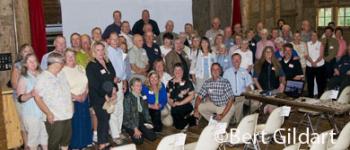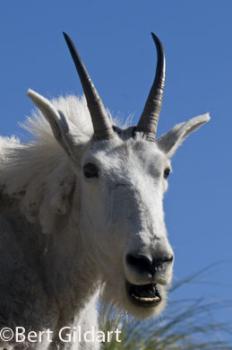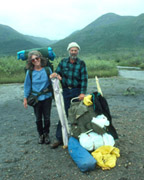Bob Frauson Memorial Service-”See You Next Spring”
©Bert Gildart: This past weekend about 150 people gathered from all points of the United States, and from Canada, to pay homage to a former Glacier Park ranger. In itself the group represented a unique gathering that embodied a significant chapter of the park’s history, and in my early years, some of the assembled people influenced me greatly to include the man we had all gathered to honor.

East Glacier, co-workers at memorial service July 19, 2008
Bob Frauson was that man and in brief, the ranger had distinguished himself in every facet of his life, for he had been a member of the elite 10th Mountain Division and served in Italy during WWII. After the war Bob returned to college, worked briefly as a teacher, but soon found employment in his chosen field as a National Park Service ranger. As such he worked in parks in Wyoming and in Colorado before moving to Glacier where he subsequently served for 20 years–all on the park’s east side. In 1982, he retired as a district ranger, and remained in the Flathead Valley until his death this past June.
SEARCH AND RESCUE
My first encountered with this legendary man was 1962 and my acquaintance was under adverse conditions. It involved an attempt to find a friend, one with whom I worked and with whom I had climbed several of the park’s mountains.

Still part of Bob's world July 20, 2008
At the time David Wilson and I lived in a tent camp near West Glacier with a group of other young men, all working for the park in the woods and on the trails. We were young college students and one weekend David and I decided to climb Heaven’s Peak , which we did successfully. David, however, was somewhat of a loner, and the very next weekend he decided to climb Going-to-the-Sun Mountain all alone, something, of course, we are all advised not to do. When David did not return to the tent camp as scheduled we all became concerned. Next day, Bob initiated a search party and soon learned that David had signed the climbing register, but after that-no word.
Though a professional climbing team searched all conceivable routes Wilson might have followed, it found nothing, and that’s when Bob called in our labor crew. Bob organized us in such a way that we covered virtually every square inch of the forested mountain side that flanked Going-to-the-Sun Mountain. But after a week-long futile search, Bob concluded that David Wilson had either fallen into a crevasse, a bear had gotten him, or–and this was always one of Bob’s theories–that David Wilson had intentionally pulled a disappearing act and had fled the country. Though that possibility had not occurred to me at the time it was a possibility that I’ve come to accept; certainly one I prefer to the alternative. At any rate, 40-some years later not one single trace has ever been found of the missing climber, and now, though I certainly remember my friendship with David Wilson, I also remember the methodical way in which Bob organized our search party. It was my first introduction to techniques used for search and rescue.
HUGE PACK
As the years went by and I completed college I later worked as a seasonal ranger in many parts of Glacier and came to know Bob better. I worked for him out of Cut Bank Ranger Station-and what so many who spoke at the Memorial Service seemed to dwell on was the incredible pack the man carried when on patrol, something I certainly remember. Bob, of course, was a big man, and when you recall that he fought in the mountains of Italy his pack’s size might not seem so surprising. His pack seemed to carry whatever was necessary for rescues or for anything else he might run into.
These are aspects of the man’s life that friends and acquaintances dwelled on Saturday, but what I can add that others did not is that he could be very persuasive about park philosophy, something I learned from the career I chose as an outdoor writer. Bears were always a major item in park management, and I had been commissioned by Smithsonian magazine to write a story about the park’s fatal maulings, a subject on which I had become very well versed because of my own personal involvement in Glacier’s first tragic maulings of 1967.
PERSUASIVE MAN
One afternoon, Bob and I debated for hours about the park’s bear management plan and the extent to which Glacier should be held responsible for deaths that had occurred along Divide Creek in the St. Mary Valley. In the end, I left with a much better understanding of bear biology and the park’s bear management plan–and those were thoughts I worked into my magazine story.
But what I now remember most is that Bob’s council was excellent on a whole range of subjects, both professional–and personal–and that it should never be ignored.

St. Mary Valley, terrific for wildflowers. July 20 2008
Though the memorial service closed with a quote from John Muir extolling the mountains that Frauson had so expertly helped manage, others closed in ways that were equally as telling. All the testimonies were excellent, but I focus on those provided by Bob Sellers, because he was another ranger whom I came to know personally and admired greatly.
“SEE YOU NEXT SPRING”
Sellers in his recollections reminisced about his and Bob’s respective roles in the park, and recalled how the two would meet in the fall in patrol cars at Logan Pass, knowing snows would soon render the road impassible on both its east and west sides.
“We also knew,” recalled Sellers, “that because we worked on opposite sides of the park we probably would not see one another until the following spring, and so that’s the way we’d part. ‘See you next spring, we’d say to one another.’ To which the other would likewise reply.”
And that’s how Sellers concluded his memories, a thought that says in effect that Bob Frauson is still overseeing the mountains we all love and that his council will always be around when needed. That’s a most satisfying thought, and one on which I find hard to improve.
“See you next spring,” concluded Sellers. “See you next spring.”

